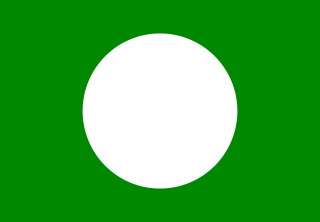Politics of Malaysia takes place in the framework of a federal representative democratic constitutional monarchy, in which the Yang di-Pertuan Agong is head of state and the Prime Minister of Malaysia is the head of government. Executive power is exercised by the federal government and the 13 state governments. Legislative power is vested in the federal parliament and the 13 state assemblies. The judiciary is independent of the executive and the legislature, though the executive maintains a certain level of influence in the appointment of judges to the courts.

The National Front is a political coalition of Malaysia that was founded in 1973 as a coalition of centre-right and right-wing political parties to succeed the Alliance Party. It is the third largest political coalition with 30 seats in the Dewan Rakyat after Pakatan Harapan (PH) with 82 seats and Perikatan Nasional (PN) with 74 seats.

The Malaysian Islamic Party, also known as the Pan-Malaysian Islamic Party or its Jawi-based acronym PAS, is an Islamist political party in Malaysia. Ideologically focused on Islamic fundamentalism, PAS's electoral base is largely centered around Peninsular Malaysia's rural and eastern coasts and conservative northern, particularly in the states of Kelantan, Terengganu, Perlis, & Kedah. They also gained significant support in the rural areas of Perak and Pahang in the last 2022 general election & 2023 state elections; dubbed as the "Green Wave".
The Barisan Alternatif was a coalition of Malaysian opposition parties, formed as a counterweight to the ruling Barisan Nasional. Disbanded after the 2004 general elections, all 4 former component parties of BA have formed a new coalition, Pakatan Rakyat, following the 2008 general elections.

The Democratic Action Party is a centre-left social democratic political party in Malaysia. As one of four component parties of the Pakatan Harapan (PH) coalition, it formed the federal government after defeating Barisan Nasional (BN) in the 2018 Malaysian general election, ending the party's 53 year-long stay in the opposition. However, before the coalition finished its first term, defections from partnering parties caused it to lose power after 22 months, culminating in the 2020 Malaysian political crisis. At the 2022 Malaysian general election, the PH coalition which the DAP was part of was returned to power again, albeit without a majority, leading it to form a unity government with political rivals.
General elections were held in Malaysia on Monday, 29 November 1999. Voting took place in all 193 parliamentary constituencies of Malaysia, each electing one Member of Parliament to the Dewan Rakyat, the dominant house of Parliament. State elections also took place in 394 state constituencies in 11 out of 13 states of Malaysia on the same day. They were the last elections for Mahathir Mohamad as Prime Minister and Chairman of Barisan Nasional, until 2018. They were also the first elections held in a single day nationwide.

General elections were held in Malaysia on Sunday, 21 March 2004. Voting took place in all 219 parliamentary constituencies, each electing one Member of Parliament to the Dewan Rakyat, the dominant house of Parliament. They were the first elections for Abdullah Ahmad Badawi as Prime Minister following his appointment in 2003. State elections also took place in 505 state constituencies in twelve of the thirteen states on the same day as Sabah took the first time election was parallel with the rest of Peninsular Malaysia.

General elections were held in Malaysia on Saturday, 10 May 1969, although voting was postponed until between 6 June and 4 July 1970 in Sabah and Sarawak. This election marked the first parliamentary election held in Sabah and Sarawak after the formation of Malaysia in 1963.
Elections in Malaysia include elections to public office of the political entities that since 1963 have composed the federation of Malaysia. At present, elections in Malaysia exist at two levels: federal level and state level. Federal level elections are those for membership in the Dewan Rakyat, the lower house of Parliament, while state level elections are for membership in the various State Legislative Assemblies. The heads of executive branch at both the federal and state levels, the Prime Minister and Menteri Besar/Chief Ministers respectively, are usually indirectly elected, filled by a member of the majority party/coalition in the respective legislatures.
The Pengkalan Pasir by-election was held on 6 December 2005 in the Pengkalan Pasir state assembly constituency of the PAS-governed state of Kelantan, Malaysia. Nominations were held on 27 November 2005, and the election was contested by Hanifa Ahmad of Pan-Malaysian Islamic Party (PAS), Hanafi Mamat of the United Malays National Organisation (UMNO) in the Barisan Nasional (BN) coalition, and Ibrahim Ali, an independent candidate. The by-election was necessitated after the death of the incumbent, Wan Abdul Aziz Wan Jaafar from PAS, on 31 October because of cancer. Wan Abdul Aziz defeated Hanafi by 55 votes in the 2004 general election. In 2005, there are 18,411 eligible voters and 195 registered postal voters; 94.8% Malay and 5.2% Chinese in Pengkalan Pasir.
General elections were held in Malaysia between Saturday, 8 July and Saturday, 22 July 1978. Voting took place in all 154 parliamentary constituencies of Malaysia, each electing one Member of Parliament to the Dewan Rakyat, the dominant house of Parliament. State elections also took place in 276 state constituencies on the same day.
General elections were held in Malaysia on 20 and 21 October 1990. Voting took place in all 180 parliamentary constituencies of Malaysia, each electing one Member of Parliament to the Dewan Rakyat, the dominant house of Parliament. State elections also took place in 351 state constituencies in 11 states of Malaysia on the same day.

General elections were held in Malaysia between Saturday, 24 August and Saturday, 14 September 1974. Voting took place in all 154 parliamentary constituencies of Malaysia, each electing one Member of Parliament to the Dewan Rakyat, the dominant house of Parliament. State elections also took place in 360 state constituencies on the same day. The elections were the first and only general elections for Tun Abdul Razak as Prime Minister following his appointment to the position in 1970. They were also the first general elections for Barisan Nasional (BN), a new political alliance replacing the Alliance Party; with the Pan-Malaysian Islamic Party (PAS), Parti Gerakan Rakyat Malaysia (PGRM) and the People's Progressive Party (PPP) joining the parties from the old Alliance.

General elections were held in Malaysia on Saturday, 8 March 2008. Voting took place in all 222 parliamentary constituencies of Malaysia, each electing one Member of Parliament to the Dewan Rakyat, the dominant house of Parliament. State elections also took place in 505 state constituencies in 12 of the 13 states on the same day.
State assembly elections were held in Malaysia on 29 November 1999 in all states except Sabah and Sarawak. The elections were held alongside general elections, and saw the opposition win a total of 113 seats, 98 of which went to the Pan-Malaysian Islamic Party (PAS), 11 to the Democratic Action Party (DAP) and 4 for the People's Justice Party. In the states of Kelantan and Terengganu, the PAS won by a huge margin–41-2 against Barisan Nasional and 28-4 respectively–hence allowing them to form the state governments in these states. In addition, the PAS also captured one-third of the seats in Kedah, with the remaining two-thirds going to Barisan Nasional.
State assembly elections were held in Malaysia on 21 October 1990 in all states except Sabah and Sarawak. The Barisan Nasional won ten out of the 11 elections. The Muslim Unity Movement won all 39 state seats in Kelantan to form the state government, with 24 seats going to the Pan-Malaysian Islamic Party and 15 for Semangat 46.
State assembly elections were held in Malaysia on 8 March 2008 in all states except Sarawak. The elections took place alongside general elections.

The 14th Kedah State election was held on 9 May 2018, concurrently with the 2018 Malaysian general election. The previous state election was held on 5 May 2013. The state assemblymen is elected to 5 years term each.
The 14th Perlis State election was held on 9 May 2018. The previous state election was held on 5 May 2013. The state assemblymen is elected to 5 years term each.

The National Alliance is a political coalition composed of the Malaysian United Indigenous Party, Malaysian Islamic Party, Malaysian People's Movement Party and Sabah Progressive Party. This coalition was preceded by the Malaysian Party Alliance Association, also known as the Persatuan Perikatan Parti Malaysia (PPPM). It is the second largest political coalition in Dewan Rakyat with 74 seats after Pakatan Harapan (PH) with 81 seats; dubbed as the "Green Wave".









